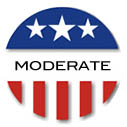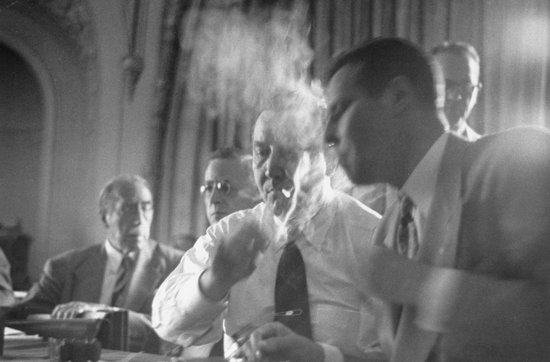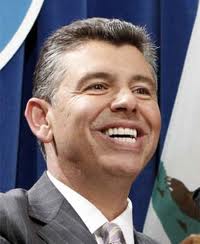At this weekend’s California Republican Party Convention, there will be some lively debate over the issue of how the party reacts to the passage of Proposition 14, the so-called “open primary” measure promoted by Arnold Schwarzenegger and Abel Maldonado, the express purpose of  which was to moderate the party. Let’s be very, very clear on this point, because it is pivotal to the discussion, and should be the cornerstone issue by which CRP delegates think about how to proceed.
which was to moderate the party. Let’s be very, very clear on this point, because it is pivotal to the discussion, and should be the cornerstone issue by which CRP delegates think about how to proceed.
Schwarzenegger, Maldonado, and the “big business” community headed by the California Chamber of Commerce, as proponents of Prop 14, could not have been more clear. First and foremost, they actually put in the Official Voters Guide (signed by the CalChamber President) the following description in the arguments FOR Prop 14: “Supporters of Proposition 14 believe: The Top Two primary system will put more moderate politicians in office."
Here are some additional quotes from former Governor Schwarzenegger and former Lt. Governor Maldonado making their intentions clear…
- Gov. Arnold Schwarzenegger applauded the supreme court’s decision. He says Proposition 14 will bring in more moderate lawmakers who will "put aside partisanship." — Contra Costa Times, 12-16-10:
- Prop 14 is the latest attempt to create a more hospitable environment for moderates in the two parties to come together in the center. "The system we have today makes candidates go to the extreme right on the Republican side and the extreme left on the Democratic side, and when they come together [in Sacramento], they can’t govern," [Abel] Maldonado said. "Governing is hard, but we must govern." — Washington Post, 6-6-10:
- Proponents of Proposition 14, such as Republican Gov. Arnold Schwarzenegger and Lt. Gov. Abel Maldonado, argue that the change would benefit moderates who often stumble in primaries where party activists have an oversized say in the outcome. — MSNBC, 5-30-10
From the perspective of Republicans — especially in "red" parts of the state, the main way that Proposition 14 achieves the objectives of Schwarzenegger and Maldonado, is by cross-over voting. In the June election (which is now very much a “general” election, with all voters, regardless of party registration, being able to vote for any candidate), liberal Democrat voters will be able to cast their votes for their “favorite” (liberal) Republican candidate, and in doing so very much play a role in determining which registered Republican is the “top vote getter” in a district.
In the 2000 election cycle, the only time in recent history that we can look at the actual results of an open primary (Prop. 198 was in effect that one cycle before being tossed by the United States Supreme Court), we saw a significant number of “safe” conservative Republicans seats where the more conservative candidate was narrowly edged out by a liberal Republican candidate, thanks to cross-over voting. It makes sense – if you are a Democrat in a strong GOP district, you know (or become "educated" to the fact) that a candidate from your own party can’t win in November – so you instead vote for the most liberal Republican.
This is the mechanism within Proposition 14 that presents a “clear and present danger” to the future of the Republican Party in California. After all, a party is defined by its candidates and its officeholders. Proposition 14 seeks to literally redefine the California Republican Party into one that is less conservative, and more moderate. Like I pointed out above, this is not a secret agenda – it is a stated objective.
Therein lies the most significant and troubling part of the rules proposal of moderate Bakersfield Congressman Kevin McCarthy. Rather than acknowledging that the cross-over voting factor that will be present in every race for every partisan office in California represents a danger to the party, and putting forward a plan for how to deal with the negative effects of Democrat voters en masse picking their “favorite” Republican in every June showdown, McCarthy’s plan actually does just the opposite. In a proposal that literally could have been written by Schwarzenegger or Maldonado, McCarthy’s plan specifically says that the Republican Party will stay out of June contests as a rule, with an exception being made in rare instances.
 In order for local party leaders (elected county central committee members and CRP delegates) to come together and counter the negative influence of this massive influx of non-Republicans determining the top-vote-getting Republican candidate, McCarthy’s plan first requires the exclusive 22 member CRP Board of Directors must make a finding of “extraordinary circumstances” by a 2/3rd vote of the Board — moving the decision making to the proverbial "smoke filled back room."
In order for local party leaders (elected county central committee members and CRP delegates) to come together and counter the negative influence of this massive influx of non-Republicans determining the top-vote-getting Republican candidate, McCarthy’s plan first requires the exclusive 22 member CRP Board of Directors must make a finding of “extraordinary circumstances” by a 2/3rd vote of the Board — moving the decision making to the proverbial "smoke filled back room."
To be very specific, McCarthy’s proposal says that local party leaders can consider weighing into a contest before the June election only if, “The Board of Directors by a 2/3 majority vote determines that for a specific district extraordinary circumstances require an endorsement of the CRP in order to ensure that other political parties or hostile interests do not determine the Republican general election nominee…”
In other-words, the potential (and as we saw in 2000, it was an actuality) of Democrats cross-voting in every district does not strike moderate McCarthy as alarming or disturbing enough to “allow” local party leaders to make their own decision about what to do before June. I don’t know about you, but I would define a swath of liberal Democrats voting to determine the top-vote getting Republican in a district as an “extraordinary circumstance” in every part of the state, all of the time. While there is always the danger that the public employee unions could weigh in to give the liberal pretender a final push (that happened in 2000 in some districts), the clear and present danger is presented by the independent actions of tens of thousands (or in the case of statewide races, hundreds of thousands) of liberal voters crossing over to impact who the GOP standard bearer will be in a November run-off.
To put it another way, why would we want to empower eight CRP Board Members (some of whom will have supported Prop. 14) with the ability to sideline the ability of local Republican leaders to decide how to handle the party’s involvement before the June “jungle” election? I say eight because with the onerous two-thirds requirement of the board, all it takes is eight board members to block the CRP from getting involved in any race. It is worth noting that if every officer elected at this coming convention – from Chairman and Vice Chairman down to the regional Vice Chairmen – voted to empower local decision-making, there are still enough votes on the CRP Board to block their effort.
It is not insignificant, by the way, that major funding to pass Proposition14 came from California’s “big business” community – such as the CalChamber – who politically backed the massive tax increase attached to 2009’s Proposition 1A, which was fortunately opposed by the CRP and defeated by voters. I bring this up because you should not underestimate the influence of lobbyists for these interests to pressure the CRP Board – and remember their goal – to allow Proposition 14 to moderate the party!
It is obviously the major objective or our party to elect Republicans and defeat Democrats. Lord knows that in the State Legislature, this is critical as Democrats are terribly close to having the two-thirds votes in each chamber they need to raise taxes unilaterally. But it is significant for us all to remember that it does us no good as a party to work to pick up seats in November that are held by Democrats, if we “lose” safe Republican seats to liberals in June in the form of registered Republican candidates who do not believe in the core values of our party. We already have a tremendous problem with Republican legislators who vote for higher taxes – as your read this, a handful of them are currently flirting with placing a massive tax increase on the ballot in return for some negotiated spending and pension reforms.
I will close this commentary by reemphasizing some key points. The purpose of Proposition 14 is to moderate political parties – including the Republican Party. The main mechanism by which it seeks to do so is by this insidious system of cross-voting that allows liberal Democrats to try to elevate the registered Republican of their choosing into the November run-off. The McCarthy proposal seeks to largely keep the party silent during this clear and present danger to our party, asserting that for local party activists to engage, something “above and beyond” this cross voting must take place and the CRP Board, by a super-majority, has to give its permission.
Look, none of us like the terrible situation in which we find ourselves. We all preferred the old system – letting Republican voters choose our nominee, guaranteed a spot on the general election ballot. We now find ourselves having to choose the “least unattractive” option. For my part, I would rather involve local Republican leaders in a process to help protect the party going into the June elections, than doing what Kevin McCarthy proposes, which is to let the Schwarzenegger-Maldonado plan move forward, thus moderating our party’s candidates.
I encourage CRP delegates to support CRP Chairman Ron Nehring’s Rules proposal this weekend. The Chairman’s proposal was written with the idea that in a Proposition 14 world, local party leaders should be engaging in each and every race and making their own determination as  to a course of action – not placing all of that power in a 22-member Board of Directors that is subject to intense pressure and lobbying.
to a course of action – not placing all of that power in a 22-member Board of Directors that is subject to intense pressure and lobbying.
Oh yes, if you were not aware of it, in anticipation of a new Republican U.S. House seat being drawn along the Central Coast, Proposition 14’s author, Abel Maldonado, has announced that he is running for Congress. He will be intently watching what we do this weekend. As a passionate advocate for amnesty for illegal aliens in the U.S., Maldonado is counting on a massive number of Democrats crossing over to make sure he is the registered Republican with the most votes. It might provide clarity to this issue to think about how he specifically stands to benefit if the McCarthy plan is adopted.

